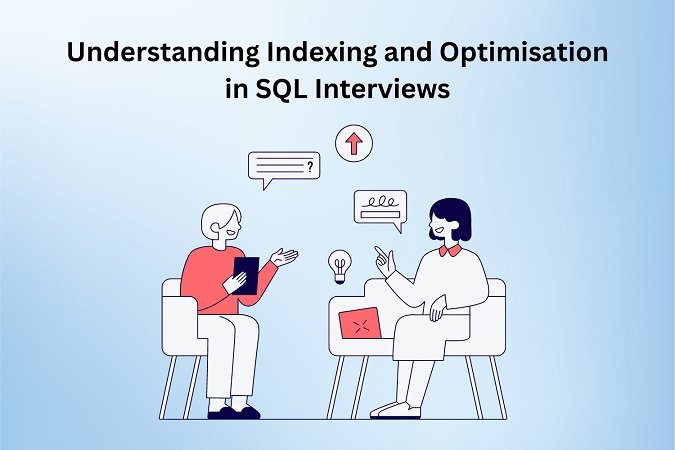Understanding Indexing and Optimisation in SQL Interviews

Efficient data retrieval and query performance are ensured by indexing and optimisation in database management and SQL (Structured Query Language). Understanding indexing and optimisation is vital for SQL professionals to complete their daily tasks or for qualifying SQL interviews. To ensure that you feel prepared and ready for your SQL Interview Questions, this blog will explore indexing basics, optimisation methods, and best practices.
Table Of Contents
- What is Indexing in SQL?
- Types of Indexes in SQL
- Benefits of Indexing
- Optimisation Techniques in SQL
- Best Practices for Indexing and Optimisation
- Common Interview Questions on Indexing and Optimisation
- Conclusion
What is Indexing in SQL?
An index is a data structure that speeds up data retrieval operations on tables in SQL databases. It is built on a subset of a table’s columns to improve query efficiency and decrease disc I/O operations.
Types of Indexes in SQL
Primary Index
The definition of a primary key constraint on a table triggers the automatic creation of a primary index. It is also the principal way to retrieve rows from the table, ensuring uniqueness.
Secondary Index
Created independently of the data, a secondary index (often called a non-clustered index) expedites retrieval for columns other than the primary key.
Clustered Index
Using the indexed column(s), a clustered index can rearrange the physical storage of a table’s entries on a disc. For range-based searches, this can significantly enhance query performance.
Composite Index
If your query uses conditions on more than one column, you may want to consider using a composite index, which uses multiple columns.
Benefits of Indexing
Improved Data Retrieval Speed
With the help of indexes, SQL databases can skip scanning the whole table and get the rows or ranges of rows they need much faster.
Better Query Performance
Queries that use indexed columns can run more quickly, improving the system’s overall performance.
Efficient Sorting and Joins
Indexes provide for efficient sorting operations and can accelerate join operations between tables, leading to more efficient data management.
Optimisation Techniques in SQL
Query Optimisation
To make SQL queries run faster, examining and changing them is necessary. Query execution performance can be significantly improved by optimising WHERE clauses, using appropriate join types (e.g., INNER JOIN, LEFT JOIN), and minimising extraneous calculations or functions.
Index Selection
Optimisation relies heavily on index selection, which entails picking appropriate table indexes according to query and access patterns. Use tools like EXPLAIN to analyse query execution strategies and find index optimisation opportunities.
Table Partitioning
To increase query performance, partition big tables into smaller, more manageable portions. This reduces the amount of data that needs to be scanned, improving query speed.
Normalisation and Denormalisation
Data storage is optimised by normalisation, which reduces redundancy, and read speed can be improved by denormalisation, which reduces the need for complex joins in some instances.
Statistics Management
Improving performance is a byproduct of well-managed statistics, which allows the query optimiser to make the right decisions regarding query execution plans.
Caching and Memory Management
Optimising memory allocation for database operations and utilising caching technologies can decrease disc I/O and increase overall system responsiveness.
Best Practices for Indexing and Optimisation
Learn Query Patterns
Examine typical access and query patterns to find the best indexing strategies.
Regular Performance Monitoring
To find performance bottlenecks and optimisation opportunities, it is recommended to frequently monitor database performance with tools such as SQL Server Profiler or MySQL Performance Schema.
Avoid Over-Indexing
Although indexes can speed up queries, doing so at the expense of storage overhead and write operations speed is something to avoid. Find the spot where optimising questions and making good use of resources coexist.
Use Indexing Tools
Make use of database administration utilities and tools that provide advice on optimising performance and indexing data.
Test and Benchmark
Before and after adopting optimisation measures, test and benchmark query performance thoroughly to quantify improvements properly.
Common Interview Questions on Indexing and Optimisation
- Can you tell me how clustered indexes vary from non-clustered ones?
- When indexing a table, how do you choose which columns to use?
- Outline what index fragmentation is and how to fix it.
- Does utilising indexes in SQL databases have any restrictions or advantages?
- The effects of indexing on the INSERT, UPDATE, and DELETE procedures should be discussed.
- If a SQL query runs slowly, what are some ways to speed it up?
- How is query optimisation related to query execution plans?
- Justify the use of database statistics for optimising queries.
- What steps would you take if you were optimising a database for read-heavy workloads?
- What is the best way to manage index monitoring and maintenance in a live setting?
Conclusion
Excelling in interviews and improving database performance in real-world circumstances require SQL pros to master indexing and optimisation techniques. Optimise query performance, boost system efficiency, and ace SQL interviews by mastering indexing fundamentals, utilising optimisation strategies, and keeping up with best practices. For more information visit: The Knowledge Academy.












